This chapter has two aims. Firstly, it summarises the story in Robert Tressell’s The Ragged Trousered Philanthropists, and helps readers find details of the many people, places and organisations described in the 250,000 words. Secondly, it explains how this Edwardian ‘fiction’ is often describing facts of life in Hastings and St Leonards at that time. Where possible, fiction becomes fact.
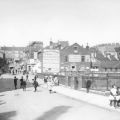 |
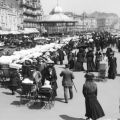 |
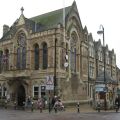 |
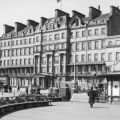 |
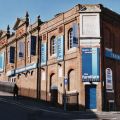 |
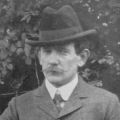 |
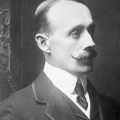 |
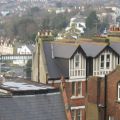 |
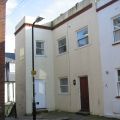 |
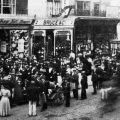 |
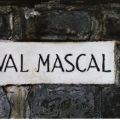 |
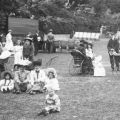 |
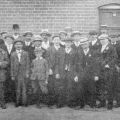 |
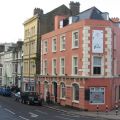 |
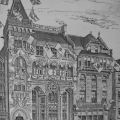 |
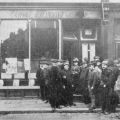 |
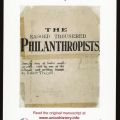 |
Everything here is either a quote (in “quotation marks”) from The Ragged Trousered Philanthropists, or is a summary of material in the book, [apart from material in italic in square brackets, like this, which is supplementary data or comment from the editor of this work, Steve Peak. Quotes from ‘Ball’ in these brackets are from Fred Ball’s biography ‘One of the Damned’, 1979 edition.] The numbers in square brackets [99] are references to the pages in the 1993 Flamingo Modern Classic edition of the book from which the quote or material comes.
The words "ragged trousered philanthropist/s" appear twice in the book, on pages 392 and 534, with the “ragged trousered Tory workmen” on page 529, and just the “p/Philanthropist/s” on pages 435 (three times), 534, 538 (twice) and 573. Robert Tressell’s real surname was Noonan. He is believed to have adopted the new name from the widely-used word “tressel” (with one “l”), meaning the free-standing support legs that were commonly used in the building trade. “Tressel” appears only very occasionally in the book, except on pages 518-22, where it is used seven times, referring to the preparations for a funeral: “Hunter placed the pair of tressels he had been carrying against the wall. … They arranged the tressels and then brought in the coffin and placed it upon them.” [519 and 522] The word “tressell” (with two “l”s) is not in the book.
Background
Tressell begins the preface by saying: “In writing this book my intention was to present, in the form of an interesting story, a faithful picture of working-class life – more especially of those engaged in the building trades – in a small town in the south of England.
“I wished to describe the relations existing between the workmen and their employers, the attitude and feelings of those two classes towards each other; the condition of the workers during the different seasons of the year, their circumstances when at work and when out of employment: their pleasures, their intellectual outlook, their religious and political opinions and ideals.” [13] Tressell aims to “show the conditions resulting from poverty and unemployment: to expose the futility of the measures taken to deal with them and to indicate what I believe to be the only real remedy, namely – Socialism. I intend to explain what Socialists understand by the word ‘Poverty’: to define the Socialist theory of the causes of poverty, and to explain how Socialists propose to abolish poverty.” [13]
The novel “possesses at least one merit – that of being true. I have invented nothing. There are no scenes or incidents in the story that I have not either witnessed myself or had conclusive evidence of. ... The scenes are typical of every town in the South of England.” [14]
Mugsborough was “a community composed for the most part of ignorant semi-imbeciles, slaves, slave-drivers and psalm-singing hypocrites.” [195]
“The action of the story covers a period of only a little over twelve months” [13] [This was probably from November in the first year to just before Christmas Day in the second. There are indications in the book that the 13 months were based on 1904/5 or 1905/6, with later material added.]
Mugsborough: The Layout
“Mugsborough was a town of about 80,000 inhabitants, about 200 miles from London. It was built in a verdant valley. Looking west, north or east from the vicinity of the fountain on Grand Parade in the centre of the town, one saw a succession of pine-clad hills. To the south, as far as the eye could see, stretched a vast cultivated plain that extended to the south coast, 100 miles away. The climate was supposed to be cool in summer and mild in winter.
“The town proper [Hastings] nestled in the valley: to the west, the most beautiful and sheltered part was the suburb of Irene [St Leonards]: here were the homes of the wealthy residents and prosperous tradespeople, and numerous boarding houses for the accommodation of well-to-do visitors. East, the town extended up the slope to the top of the hill [the West Hill] and down the other side to the suburb of Windley [Hastings Old Town], where the majority of the working classes lived.
“Years ago, when the facilities for foreign travel were fewer and more costly, Mugsborough was a favourite resort of the upper classes, but of late years most of these patriots have adopted the practice of going on the Continent to spend the money they obtain from the working people of England. However, Mugsborough still retained some semblance of prosperity. Summer or winter the place was usually fairly full of what were called good-class visitors, either holiday-makers or invalids. The Grand Parade [seafront] was generally crowded with well-dressed people and carriages. The shops appeared to be well-patronised and at the time of our story an air of prosperity pervaded the town. But this fair outward appearance was deceitful. The town was really a vast white sepulchre; for notwithstanding the natural advantages of the place, the majority of the inhabitants existed in a state of perpetual poverty which in many cases bordered on destitution. One of the reasons for this was that a great part of the incomes of the tradespeople and boarding-house-keepers and about a third of the wages of the working classes were paid away as rent and rates.” [588].
The Grand Parade faced south. About halfway along it was the Fountain, [287] with the Wage Slave Market nearby. This was the meeting place of unemployed men. [335, 368] Several roads met near the Market. [542]
There was a “little place they call the ‘Kiosk’ down the Grand Parade, near the bandstand ... where they used to sell refreshments.” [206] This quite large building belonged to the Corporation; and had been closed for two years because it did not pay. Cllr Grinder, the fruit merchant, took it over, aiming to re-open it as the Cosy Corner Refreshment Company, “a high-class refreshment lounge.” [355] But he only did this on the understanding that the Corporation would spend £175 on repairing the premises and then charge him just £20 a year rent on a five-year lease, leaving the Council £75 out of pocket. [361, 367]
Also on Grand Parade was a shop that had been a high-class restaurant, Macaroni's Royal Italian Cafe kept by a renowned Italian chef. [Di Marco’s Restaurant, 6 Pelham Arcade, part of the popular section of seafront below Hastings Castle.] This had been a favourite resort of the ‘elite’, for afternoon tea and coffee and little suppers after theatre. But it went bankrupt and was shut for several months. Then the shop was let to dealers in fancy articles and the other part was changed to flats. Rushton & Co did the work.
Frank Owen, hero of The Ragged Trousered Philanthropists, lived in a flat in Lord Street [Milward Road, Hastings], “almost in the centre of the town” [76]. Lord Street had originally been mostly aristocratic, but its former residents had migrated to the west of the town [St Leonards], although it was still respectable. He was on the top floor of a house that once been a private dwelling but now was five flats. [Grosvenor Mansions, 115 Milward Road, where Tressell lived from 1902 to 1906.]. He could see the railway from a window, including the bridge. The "lofty window ... overlooked several of the adjacent streets and a great part of the town". [586] There was a newsagent on the corner with Kerk Street, and a stationer's shop at the end of the street, a few minutes walk. Twenty yards away was a shop that was a grocer's: A Smallman. [327] A little further on, at the opposite corner, were the premises of the Monopole Provision Stores, which was slightly cheaper than A Smallman. Owen’s flat was 20 minutes from Jack Linden’s small cottage in Windley.
In a discussion Owen had with some workmates, Bill Easton said that “the country is being ruined by foreigners”, as proved in the Obscurer, the local Tory-owned newspaper [the Hastings Observer] [22] “'Wy, even ‘ere in Mugsborough,’ chimed in Sawkins … ‘We’re overrun with ‘em! Nearly all the waiters and the cook at the Grand Hotel where we was working last month is foreigners.’ “’Yes,’ said old Joe Philpot, tragically, ‘and then thers all them Hitalian horgin grinders, an’ the blokes wot sells ‘ot chestnuts: an’ wen I was goin’ ‘ome last night I see a lot of them Frenchies sellin’ hunions, an’ a little wile afterwards I met two more ‘em comin’ up the street with a bear.’ …
“It was a dam’ shame that these people were allowed to take the bread out of English people’s mouths: they ought to be driven into the bloody sea.” [22-23]
Mugsborough Council
“The town of Mugsborough was governed by a set of individuals called the Municipal Council. Most of these ‘representatives of the people’ were well-to-do or retired tradesmen. In the opinion of the inhabitants of Mugsborough, the fact that a man had succeeded in accumulating money in business was a clear demonstration of his fitness to be entrusted with the business of the town.
“Consequently, when that very able and successful man of business Mr George Rushton was put up for election to the Council he was returned by a large majority of the votes of the working men who thought him an ideal personage.” [194] He was the owner of the prominent building firm Rushton & Co that Owen worked for.
The Council was also known as the Band of Brigands. “One of the most energetic members of the Band was Mr Jeremiah Didlum, the house furnisher, who did a large hire system trade. He had an extensive stock of second-hand furniture that he had resumed possession of when the unfortunate would-be purchasers failed to pay the instalments regularly. Other of the second-hand things had been purchased for a fraction of their real value at Sheriff’s sales or from people whom misfortune or want of employment had reduced to the necessity of selling their household possessions.
“Another notable member of the Band was Mr Amos Grinder; who had practically monopolized the greengrocery trade and now owned nearly all the fruiterers’ shops in the town. As for the other shops, if they did not buy their stocks from him - or, rather, the company of which he was managing director and principal shareholder - if these other fruiterers and greengrocers did not buy their stuff from his company, he tried to smash them by opening branches in their immediate neighbourhood and selling below cost. He was a self-made man: an example of what may be accomplished by cunning and selfishness.” [195]
[Amos Grinder was probably modeled on the leading businessman Major Stanley T Weston, who was then chairman of the leading Hastings wholesale greengrocers Paine, Rogers & Company and was a councilor for many years, and mayor in 1906-7. At that time he was also deputy chairman of the very profitable Hastings Gas Company the secretary of the Hastings Omnibus Company and the St Leonards Grand Hotel Company, plus a director of the Hastings Pier Company and the Eversfield Hotel Company.]
“Then there was the Chief of the Band – Mr Adam Sweater, the Mayor. He was always the Chief, although he was not always Mayor, it being the rule that the latter ‘honour’ should be enjoyed by all the members of the Band in turn. A bright ‘honour’, forsooth! to be the first citizen in a community composed for the most part of ignorant semi-imbeciles, slaves, slave-drivers and psalm-singing hypocrites.
“Mr Sweater was the managing director and principal shareholder of a large drapery business in which he had amassed a considerable fortune. This was not very surprising, considering that he paid none of his workpeople fair wages and many of them no wages at all. He employed a great number of girls and young women who were supposed to be learning dressmaking, mantle-making or millinery. These were all indentured apprentices, some of whom had paid premiums of from five to ten pounds. They were ‘bound’ for three years. For the first two years they received no wages: the third year they got a shilling or eightpence a week. At the end of the third year they usually got the sack, unless they were willing to stay on as improvers at from three shillings to four and sixpence per week.” [195]
There was a branch of Sweater’s business called the Homeworkers Department, which “employed a large number of women making ladies’ blouses, fancy aprons and children’s pinafores. Most of these articles were disposed of wholesale in London and elsewhere, but some were retailed at ‘Sweater’s Emporium’ in Mugsborough and at the firm’s other retail establishments throughout the county. Many of the women workers were widows with children, who were glad to obtain any employment that did not take them away from their homes and families.
“The blouses were paid for at the rate of from two shillings to five shillings a dozen, the women having to provide their own machine and cotton, besides calling for and delivering the work. These poor women were able to clear from six to eight shillings a week: and to earn even that they had to work almost incessantly for 14 or 16 hours a day. There was no time for cooking and very little to cook, for they lived principally on bread and margarine and tea. Their homes were squalid, their children half-starved and raggedly clothed in grotesque garments hastily finished out of the cast-off clothes of charitable neighbours.” [197]
“By these and similar means Adam Sweater had contrived to lay up for himself a large amount of treasure upon earth, besides attaining undoubted respectability; for that he was respectable no one questioned. He went to chapel twice every Sunday, his obese figure arrayed in costly apparel, consisting – with other things – of grey trousers, a long garment called a frock-coat, a tall silk hat, a quantity of jewellery and a morocco-bound gilt-edged Bible. He was an official of some sort of the Shining Light Chapel. His name appeared in nearly every published list of charitable subscriptions. No starving wretch had ever appealed to him in vain for a penny soup ticket.” [198]
Sweater was “a very tall, obese figure, with a large, fleshy, coarse-featured, clean-shaven face, and a great double chin, the complexion being of the colour and appearance of the fat of uncooked bacon. A very large fleshy nose and weak-looking pale blue eyes, the slightly inflamed lids being almost destitute of eye-lashes. He had large fat feet … fat legs.” [107]
About ten years previously Sweater had married Councillor Grinder’s niece, who used to manage one of her uncle’s shops. Building labourer Jack Linden recalled: “I remember it very well because there was a lot of talk about it at the time. By all accounts, ole Sweater used to be a regler ‘ot un: no one never thought as he’d ever git married at all: there was some funny yarns about several young women what used to work for him.” [20]
[Adam Sweater was possibly partially modeled on Cllr Charles Eaton, mayor in 1904-5, who ran a drapery shop at 48 High Street, although he was not as influential in the local establishment as Sweater, and there were several bigger drapery businesses in the town.]
In mid-October of the second year of the story, the Tory MP Sir Graball D’Encloseland was promoted in the government, for which he would receive £150 per week, and therefore had to resign his seat and seek re-election. [528-9] Sweater stood against him for the Liberals and was elected as MP in late October by 4,221 votes to 4,200. [549]
“There was only one member of the Council who did not belong to the Band – Cllr Weakling, a retired physician; but unfortunately he was also a respectable man. When he saw something going forwards that he did not think was right, he protested and voted against it and then – he collapsed! There was nothing of the low agitator about him. As for the Brigands, they laughed at his protests and his vote did not matter.
“With this one exception, the other members of the Band were very similar in character to Sweater, Rushton, Didlum and Grinder. They had all joined the Band with the same objects, self-glorification and the advancement of their private interests.” [199]
“These Brigands did just as they pleased. No one ever interfered with them. They never consulted the ratepayers in any way.” [194]
“Now and then, when details of some unusually scandalous proceedings of the Council’s leaked out, the townspeople – roused for a brief space from their customary indifference – would discuss the matter in a casual, half-indignant, half-amused, helpless sort of way; but always as if it were something that did not directly concern them. It was during some such nine days’ wonder that the title of ‘The Forty Thieves’ was bestowed on the members of the Council by their semi-imbecile constituents, who, not possessing sufficient intelligence to devise means of punishing the culprits, affected to regard the manoeuvres of the Brigands as a huge joke.” [199]
“Owing to the extraordinary apathy of the other inhabitants, the Brigands were able to carry out their depredations undisturbed. Daylight robberies were of frequent occurrence.” [199]
At one meeting of the Council, Cllr Didlum proposed that the salary of the Borough Engineer, Mr Oyley Sweater, be increased from £15 to £17 a week. “Cllr Weakling, whose rise was greeted with derisive laughter, said he must oppose the resolution. He wished it to be understood that he was not actuated by any feeling of personal animosity towards the Borough Engineer, but at the same time he considered it his duty to say that in his (Dr Weakling’s) opinion, that official would be dear at half the price they were now paying him. (Disturbance.) He did not appear to understand his business, nearly all the work that was done cost in the end about double what the Borough Engineer estimated it could be done for. (Liar.) He considered him to be a grossly incompetent person (uproar) and was of the opinion that if they were to advertise they could get dozens of better men who would be glad to do the work for five pounds a week. He moved that Mr Oyley Sweater be asked to resign and that they advertise for a man at five pounds a week. (Great uproar.) …
“The Mayor – Alderman Sweater – said that he did not think it consistent with the dignity of that Council to waste any more time over this scurrilous amendment.” [363] It was voted out. [The Hastings borough engineer was then Mr PH Palmer, a freemason. In May 1905 councillors had a heated debate over his salary and perks, which meant he was paid much more than engineers in neighbouring towns, and it was agreed to cut them.]
“For years the Corporation had been borrowing money for necessary public works and improvements, and as the indebtedness of the town increased the rates rose in proportion, because the only works and services undertaken by the Council were such as did not yield revenue. Every public service capable of returning direct profit was in the hands of private companies, and the shares of the private companies were in the hands of the members of the Corporation, and the members of the Corporation were in the hands of the four most able and intellectual of their number, Councillors Sweater, Rushton, Didlum and Grinder, each of whom was a director of one or more of the numerous companies which battened on the town.
“The Tramway Company, the Water Works Company, the Public Baths Company, the Winter Gardens Company, the Grand Hotel Company and numerous others. There was, however, one Company in which Sweater, Rushton, Didlum and Grinder had no shares, and that was the Gas Company, the oldest and most flourishing of them all. This institution had grown with the place; most of the original promoters were dead, and the greater number of the present shareholders were non-residents; although they lived on the town, they did not live in it.
“The profits made by this Company were so great that, being prevented by law from paying a larger dividend than 10%, they frequently found it a difficult matter to decide what to do with the money. They paid the Directors and principal officials – themselves shareholders, of course – enormous salaries. They built and furnished costly and luxurious offices and gave the rest to the shareholders in the form of Bonuses.
“There was one way in which the Company might have used some of the profits: it might have granted shorter hours and higher wages to the workmen whose health was destroyed and whose lives were shortened by the terrible labour of the retort-houses and the lime-sheds; but of course none of the directors or shareholders ever thought of doing that. It was not the business of the Company to concern itself about them.” [588-9]
For a long time the Band of Brigands “had looked with greedy eyes upon the huge profits of the Gas Company. They thought it was a beastly shame that those other bandits should be always raiding the town and getting clear away with such rich spoils.” [199] About two years previously the council secretly formed the Mugsborough Electric Light Supply & Installation Company Ltd, presided over by the mayor, Alderman Sweater. The aim of MELSIC was to drive out the Gas Company and “capture the spoils at present enjoyed by the latter for themselves.” [200] The MELSIC directors bought the site for the Electric Light Works from the Municipal councillors – ie, themselves – for half its value. The Gas Company also being the town’s largest consumer of coal, the councillors raised the duty on coal being brought in to the borough from 2/- to 3/- per ton. But the Gas Company then retreated from Mugsborough, entrenched themselves in a strong position just beyond the borough boundary and sold gas in the town without having to pay the coal dues.
“This masterly stratagem created something like a panic in the ranks of the Forty Thieves. At the end of two years they found themselves exhausted with the protracted campaign, their movements hampered by a lot of worn-out plant and antiquated machinery, and harassed on every side by the lower charges of the Gas Company. They were reluctantly constrained to admit that the attempt to undermine the Gasworks was a melancholy failure, and that the MELSIC was a veritable white elephant. They began to ask themselves what they should do with it; and some of them even urged unconditional surrender, or an appeal to the arbitration of the Bankruptcy Court.” [201] [This story mirrors the history of the Hastings Gas Company, which built a big new gas works just outside the borough boundary in 1902-5 to preserve its high profits, and the purchase of the Hastings Electric Light Company by Hastings Council in 1897.]
The Brigands, however, did draw a personal benefit from the park [Alexandra Park], where there were not so many costly plants as there should have been - yet nearly all the members of the Council had very fine gardens! The garden of the Cave (see below) was fitted out in this way. [281] The Cave was owned by Cllr Sweater, with Cllr Rushton carrying out the building work. In the park there was also a lake, with large numbers of ducks and geese; when fattened by the public, Brigands carried them off and devoured them at home. [194] A summer-house stood near the shore of the lake. [390]
In the municipal elections just before the second Christmas in the story, the “working men voters of Dr Weakling’s ward” gave him “the dirty kick out: but Rushton, Didlum, Grinder and several other members of the band were triumphantly returned with increased majorities”. [570]
Frank Owen: His Background
[There are two key people in The Ragged Trousered Philanthropist: Frank Owen, the ‘hero’ of the book, and his friend George Barrington. Both were probably self-portraits by Tressell. The name Frank Owen may come from two active political people in Hastings who Tressell knew, Frederick Owen and Frank Willard.]
Frank Owen was a master decorator, who worked for Rushton & Co for most of the story. “He was generally regarded as a bit of a crank: for it was felt that there must be something wrong about a man who took no interest in racing or football and was always talking a lot of rot about religion and politics. If it had not been for the fact that he was generally admitted to be an exceptionally good workman, they would have had but little hesitation about thinking that he was mad. This man was about 32 years of age, and of medium height, but so slightly built that he appeared taller. There was a suggestion of refinement in his clean-shaven face, but his complexion was ominously clear, and an unnatural colour flushed the thin cheeks.” [18] He was an atheist [71] and a teetotaller. [28, 428] [Tressell was born in 1871, was 5 ft 3, weighed nine stone, was compact in build, and had a fresh complexion, says Ball p48.]
An early chapter in the book (4 - The People) describes Owen and his life. “Frank Owen was the son of a journeyman carpenter who had died of consumption when the boy was only five years old. After that his mother earned a scanty living as a needle-woman. When Frank was 13 he went to work for a master decorator who was man of a type that has now almost disappeared, being not merely an employer but a craftsman of a high order. … From this man and by laborious study and practice in his spare time, aided by a certain measure of natural ability, the boy acquired a knowledge of decorative painting and design, and graining and signwriting.
“Frank’s mother died when he was 24, and a year afterwards he married [Nora] the daughter of a fellow workman. In those days trade was fairly good and although there was not much demand for the more artistic kinds of work, still the fact that he was capable of doing them, if required, made it comparatively easy for him to obtain employment. Owen and his wife were very happy. They had one child – a boy [Frankie] – and for some years all went well. But gradually this state of things altered; broadly speaking, the change came slowly and imperceptibly, although there were sudden fluctuations.
“Even in summer he could not always find work, and in winter it was almost impossible to get a job of any sort. At last, about 12 months before the date that this story opens, he determined to leave his wife and child at home and go to try to find his fortune in London. When he got employment he would send for them. It was a vain hope. He found London, if anything, worse than his native town.” [65]
Things were so bad in London that after six months Owen “was forced to give in. The privations he had endured, the strain on his mind and the foul atmosphere of the city combined to defeat him. Symptoms of the disease that had killed his father began to manifest themselves, and yielding to the repeated entreaties of his wife he returned to his native town, the shadow of his former self. [Tressell also went to London, returning after six months, says Ball pp40-42. He may have suffered more from the tuberculosis he had had for several years, and which was eventually to kill him.]
“That was six months ago, and since then he had worked for Rushton & Co. Occasionally when they had no work in hand, he was ‘stood off’ until something came in.
“Ever since his return from London, Owen had been gradually abandoning himself to hopelessness. Every day he felt that the disease he suffered from was obtaining a stronger grip on him. The doctor told him to ‘take plenty of nourishing food’, and prescribed costly medicines which Owen had not the money to buy.
“Then there was his wife. Naturally delicate, she needed many things that he was unable to procure for her. And the boy – what hope was there for him? Often as Owen moodily thought of their circumstances and prospects he told himself that it would be far better if they could all three die now, together.
“He was tired of suffering himself, tired of impotently watching the sufferings of his wife, and appalled at the thought of what was in store for the child. …
“Thousands of people like himself dragged out a wretched existence on the very edge of starvation, and for the greater number of people life was one long struggle against poverty. Yet practically none of these people knew or even troubled themselves to inquire why they were in that condition; and for anyone else to try to explain to them was a ridiculous waste of time, for they did not want to know.
“The remedy was so simple the evil so glaringly evident, that the only possible explanation of its continued existence was that the majority of his fellow workers were devoid of the power of reasoning. If these people were not mentally deficient they would of their own accord have swept this silly system away long ago. It would not have been necessary for anyone to teach them that it was wrong. “Why, even those who were successful or wealthy could not be sure that they would not eventually die of want. In every workhouse might be found people who had at one time occupied good positions; and their downfall was not in every case their own fault. “No matter how prosperous a man might be, he could not be certain that his children would never want for bread. There were thousands living in misery on starvation wages whose parents had been wealthy people.” [66-7]
Also early in the story, Owen “appeared very frail and ill: his face was very thin and pale, and his eyes were unnaturally bright”. [75] His wife Nora “was very thin, and her pale face bore the traces of much physical and mental suffering. … Although she was really only 28 years of age, she appeared older. The boy … bore a strong resemblance to his mother. He also appeared very fragile and in his childish face was reproduced much of the delicate prettiness which she had once possessed. His feminine appearance was increased by the fact that his yellow hair hung in long curls on his shoulders. The pride with which his mother regarded this long hair was by no means shared by Frankie himself, for he was always entreating her to cut it off.” [78]
In the first December: “As far as illness was concerned, he was even worse off than most others, for the greater number of them were members of some sick benefit club, but Owen’s ill-health rendered him ineligible for membership of such societies.” [226]
Frank Owen: The Story
“Owen and his family occupied the top floor of a house that had once been a large private dwelling but which had been transformed into a series of flats.” [76] The living room “was about 12 feet square and the ceiling – which was low and irregularly shaped, showing in places the formation of the roof – had been decorated by Owen with painted ornaments. There were three or four chairs, and an oblong table, covered with a clean white tablecloth. … In the recess at the right of the fireplace – an ordinary open grate – were a number of shelves filled with a miscellaneous collection of books, most of which had been bought second-hand.” [78] The room was draughty. “Although there was a bright fire, the room was very cold, being so close to the roof.” [87] Lighting was by oil lamps.
Frankie said: “When I build our house when I’m a man, I’ll take good care not to have a gas-stove in it. That’s what runs away with all the money; we’re always putting pennies in the slot.” [167]
Owen initially worked for Rushton at The Cave. The firm had started there around mid-October in the first year. It was completed on Friday December 16, and nearly all the other workers were laid off, but Owen was kept on for the following week, writing signs, coffin plates etc.
A few days before Christmas, Owen and some other workers were walking along the Grand Parade when they encountered several men with boxes begging for money for the unemployed. These were “kind of skirmishers for the main body, which could be seen some distance behind. … There were about 300 men altogether, marching four abreast. They carried three large white banners with black letters, ‘Thanks to our Subscribers’, ‘In aid of Genuine Unemployed’, ‘The Children must be Fed’. Although there were a number of artisans in the procession, the majority of the men belonged to what is called the unskilled labourer class.” [287-8] [This demonstration is very similar to what the Hastings Mail of 19 January 1907 described as the town’s first-ever organised processions of “unemployed artisans and labourers”. The first of these was on Tuesday 15 January, when 2-300 men marched four abreast round the town, preceded by men with collecting boxes and sandwich boards asking for donations.]
During January and some of February he carried on working for Rushton, at irregular intervals. He and three others painted all the plant and the front of the shop.
Then the work dried up. There was severe weather from February 20th. Everybody suffered from little, if any, income. “As time went on the long-continued privation began to tell upon Owen and his family. He had a severe cough: his eyes became deeply sunken and of remarkable brilliancy, and his thin face was always either deathly pale or dyed with a crimson flush.” [331] Then he stayed up late one night, producing a showcard for a firm of drapes when he suffered a haemorrhage – “he was terrified to find his mouth suddenly filled with blood. For what seemed an eternity he fought for breath against the suffocating torrent.” [333]
In early and mid-March the dearth of employment continued. “During this time Owen did his best to convert the other men to his views. He had accumulated a little library of Socialist books and pamphlets which he lent to those he hoped to influence.” [367] “Towards the end of March things gradually began to improve. … Several firms began to take on a few hands. … Rushton & Co had a fair share of what work there was.” [371] Owen and three others were kept employed pretty regularly, although only working 8.30 – 4.00.
“By the beginning of April, Rushton & Co were again working nine hours a day, from seven in the morning till five-thirty at night, and after Easter they started working full time from 6am till 5.30pm.” [376] “During the early part of May the weather was exceptionally bad, with bitterly cold winds.” [385] “Towards the end of the month things began to improve all round. The weather became finer and more settled. As time went on the improvement was maintained and nearly everyone was employed. Rushton’s were so busy that they took on several other old hands who had been sacked the previous year for being too slow.” [386] As the weather became warmer, Owen’s health improved.
“All through the summer the crowd of ragged-trousered philanthropists continued to toil and sweat at their noble and unselfish task of making money for Mr Rushton.” [392] “Rushton & Co did a lot of work that summer. They did not have many big jobs, but there were a lot of little ones.” [419] “But the weather was not always hot or fine: sometimes it was quite cold, almost like winter, and there was a lot of rain that summer.” [421]
“All through the summer Owen continued to make himself objectionable and to incur the ridicule of his fellow workmen by talking about the causes of poverty and of ways to abolish it.” [426] “Owen, being a teetotaller, did not spend any of his money on drink; but he spent a lot on what he called ‘The Cause’. Every week he bought some penny or twopenny pamphlets or some leaflets about Socialism, which he lent or gave to his mates; and in this way and by means of much talk he succeeded in converting a few to his party.” [428]
Owen went on the ‘Beano’ - the annual works outing - on the last Saturday in August. [See ‘The Beano’ below.] The high point was a large meal at a pub where Barrington made a speech in defence of socialism, which was so controversial that his workmates persuaded him to give an ‘Oration’ a few days later. [See ‘George Barrington’ below.]
“The outlook for the approaching winter was – as usual – gloomy in the extreme. One of the leading daily newspapers published an article prophesying a period of severe industrial depression.” [463]
In mid-September “there was a terrible slaughter at Rushton’s. Barrington and all the casual hands were sacked. … There was only one other shop in the town that was doing anything at all to speak of, and that was the firm of Dauber and Botchit. This firm had come very much to the front during summer, and had captured several big jobs that Rushton & Co had expected to get, besides taking away several of the latter’s old customers.
“This firm took work at almost half the price that Rushton’s could do it for. … Some of the men who had worked for both firms during the summer, said that after working for Dauber and Botchit, working for Rushton seemed like having a holiday. … The other builders found it very difficult to compete with them, and between the lot of them what work there was to do was all finished or messed up in about a quarter of the time that it would have taken to do it properly.
“By the end of September there were great numbers of men out of employment, and the practical persons who controlled the town were already preparing to enact the usual farce of ‘Dealing’ with the distress that was certain to ensue. The Rev Mr Bosher talked of reopening the Labour Yard; the secretary of the OBS [Organised Benevolence Society] appealed for more money and cast-off clothing and boots – the funds of the Society had been depleted by the payment of his quarter’s salary. There were rumours that the Soup Kitchen would be reopened at an early date for the sale of ‘nourishment’, and the charitable persons began to talk of Rummage Sales and soup tickets.” [527-28]
“About the middle of October an event happened that drew the town into a state of wild excitement, and such comparatively unimportant subjects as unemployment and starvation were almost forgotten. Sir Graball D’Encloseland had been promoted to yet a higher post in the service of the country that he owned such a large part of; he was not only to have a higher and more honourable position, but also - as was nothing but right – a higher salary. His pay was to be increased to seven thousand five hundred a year or one hundred and fifty pounds per week, and in consequence of this promotion it was necessary for him to resign his seat and seek re-election. [This story draws firstly on the general election of January 1906, when the toffee-nosed Liberal Hastings MP lost his seat to the rich and superficially generous Tory Harvey Du Cros, going against the national Tory rout; and secondly on the unexpected by-election Du Cros caused in March 1908 when he suddenly stood down for health reasons (his son Arthur won).]
“The Liberals were furious. They said an election had been sprung on them. … It wasn’t fair because while they – the leading Liberals – had been treating the electors with the contemptuous indifference that is customary, Sir Graball D’Encloseland had been most active amongst his constituents for months past, cunningly preparing for the contest. He had really been electioneering for the past six months! Last winter he had kicked off at quite a number of football matches besides doing all sorts of things for the local teams. He had joined the Buffalos and the Druids, been elected President of the Skull and Crossbones Boys’ Society, and, although he was not himself an abstainer, he was so friendly to Temperance that he had on several occasions, taken the chair at teetotal meetings, to say nothing of the teas to the poor school children and things of that sort.” [528-29]
The “Liberal Three Hundred” [529] had a hurried meeting to select a candidate. But they only had a week before the election. They could not find such a person in London so they held another meeting and selected Adam Sweater.
“Both sides imported gangs of hired orators who held forth every night at the corners of the principal streets, and on the open spaces from portable platforms, and from motor cars and lorries.” [532] Sweater’s agent hired “bullies … from the neighbourhood of Seven Dials in London and were paid ten shillings a day”. [533]
In the run-up to the election, Owen, Barrington and other socialists distributed leaflets at Liberal and Tory meetings, and heckled the speakers. They also held quite a lot of informal meetings on their own, and several times they found themselves engaging in street arguments while distributing leaflets. Late one evening Barrington found Owen being violently attacked by 30-40 people, and he had to rescue Owen from the mob.
Polling day was a Monday. “The result of the poll was to be shown on an illuminated sign at the Town Hall, at eleven o’clock that night, and long before that hour a vast crowd gathered in the adjacent streets.” [548-49] The result was delayed, but eventually the sign said Sweater had won by 4,221 votes to 4,200. When Sweater’s carriage arrived at the town hall, the Liberal crowd “took the horses out and amid frantic cheers harnessed themselves to it instead and dragged it through the mud and the pouring rain all the way to ‘The Cave’ – most of them were accustomed to acting as beasts of burden – where he again addressed a few words to them from the porch.” [550]
Three weeks before Christmas in the second year Owen and Easton worked for Rushton, “painting the outside of a new conservatory at Mr Sweater’s house, ‘The Cave’”. [559] They finished this on the Friday. For the next few days there was no work. By the Thursday the weather had become dark and bitterly cold, so cold that Owen “took his overcoat out of pawn, and that week they had to almost starve”. [561] When he arrived at the Rushton yard that morning, he found Bert White trying to work in the freezing paint-shop, with no heating. The boy was shivering and frail looking. Bert said that last winter Rushton had told him not to have a fire. Owen became very angry, went out into the yard, brought in wood from a big waste heap and lit it. He told Bert to keep the fire going and then stormed along the Grand Parade to Rushton’s shop. He strode up to Rushton’s office and through open the door, without knocking. Rushton was embarrassed, because he was fondling his secretary, Miss Wade. Owen threatened to have Rushton prosecuted if he did not treat Bert better. Rushton “was guiltily conscious of so many things which he might reasonably fear to be shown up or prosecuted for if they were known, and the fact of being caught under such circumstances with Miss Wade helped to reduce him to a condition approaching terror”. [565]
Owen then went home, through a snow-storm. He began to realise that Rushton might not give him any more work, but Nora supported him. He spent that afternoon writing up the minutes of the local branch of the Painters’ Society, of which he was the secretary. [In 1897, while in Johannesburg, Tressell become secretary of the Transvaal Federated Building Trades Council, in which he played a prominent role.] They went to bed very early that night because it was so cold. Owen feared the worst. But in the morning Bert White arrived carrying a coffin plate, and saying Rushton had more work. Later that day Rushton apologised to Owen. The following Thursday evening foreman Hunter committed suicide in the office, cutting his throat with a razor. The police broke into the room, finding him lying on the floor with “his head nearly severed from his body”. [571] Scribbling on papers on his desk showed he had been trying to make an estimate for work on a house, but had failed. The coroner’s jury decided he was in a fit of temporary insanity. Crass took over his job.
In the days just before the second Christmas Owen was in poor condition. “Owen had not been doing very well during these last few months, although he was one of the few lucky ones who had had some small share of work. Most of the money he earned went for rent, to pay which they often had to go short of food. Lately his chest had become so bad that the slightest exertion brought on fits of coughing and breathlessness, which made it almost impossible to work even when he had the opportunity; often it was only by an almost superhuman effort of will that he was able to continue working at all. …
“He never had the money to go to a doctor to get advice, but earlier in the winter he had obtained from Rushton a ticket for the local hospital. … In common with the majority of workmen, Owen had a sort of horror of going for advice to this hospital, but he was so ill he stifled his pride and went. It happened that it turnout to be more expensive than going to a private doctor, for he had to be at the hospital at a certain hour on a particular morning. To do this he had to stay away from work. The medicine they prescribed and which he had to buy did him no good, for the truth was that it was not medicine that he – like thousands of others – needed, but proper conditions of life and proper food.” [578-79] [Tressell suffered from tuberculosis for many years, which steadily became worse, and killed him in February 1911.]
[Owen makes many comments throughout the book on the working of capitalism and socialist alternatives. Notable examples are “The Great Money Trick” on pages 211-5 and his description of the real cause of poverty on pages 260-80.]
George Barrington
[The somewhat mysterious George Barrington is a background figure for much of the book, mainly giving help and support to his friend Owen. Barrington came from a wealthy, middle class background, very different from the life being led by Owen, and this probably reflects the feelings that Tressell had concerning his own well-off Irish origins and experiences in South Africa compared with life in Hastings.]
Barrington was a paint labourer for Rushton. He says little for much of the book, until Rushton’s held their annual Beano outing into the countryside in late August. In a country pub Barrington announced “I am a Socialist” [447] and made a strong anti-capitalist speech. A few days later this prompted workmate Joe Philpot to organise an “Oration entitled The Great Secret, or How to Live without Work”, [468] given by Barrington inside the house in which they were working, The Refuge. This examined the history of capitalism and put forward plans for the ‘co-operative commonwealth’ of the future. [463-504, chapter 45 The Great Oration]
Barrington started his lengthy oration by saying he had divided it into two parts: “First, I will try to explain as well as I am able what Socialism is. I will try to describe to you the plan or system upon which the Co-operative Commonwealth of the future will be organised; and, secondly, I will try to tell you how it can be brought about.” [471]
He went on to say that it was childish to imagine any of the social, economic or political reforms then being proposed by the Edwardian government could deal with the near-abject poverty that the majority of people were in. “You may be deceived into thinking that such measures as those are great things. You may fight for them and vote for them, but after you have got them you will find that they make no appreciable improvement in your condition. You will still have to slave and drudge to gain a bare sufficiency of the necessaries of life. You will still have to eat the same kind of food and wear the same kind of clothes and boots as now. Your masters will still have you in their power to insult and sweat and drive. Your general condition will be just the same as at present because such measures as those are not remedies but red herrings, intended by those who trail them to draw us away from the only remedy, which is to be found only in the Public Ownership of the Machinery, and the National Organisation of Industry for the production and distribution of the necessaries of life, not for the profit of a few but for the benefit of all!
“That is the next great change; not merely desirable, but imperatively necessary and inevitable! That is Socialism!” [475-6]
Some days after the oration Barrington tried to defend socialism in a long discussion with a deeply disillusioned socialist. This character , with a scar on his forehead, is given no name. [543-7]
Barrington came from a non-working environment. “Some time previously the firm [Rushton] had done some work for a wealthy gentleman who lived in the country, some distance outside Mugsborough. This gentleman also owned some property in the town and it was commonly reported that he had used his influence with Rushton to induce the latter to give Barrington employment. It was whispered amongst the hands that the young man was a distant relative of the gentleman’s, and that he had disgraced himself in some way and been disowned by his people. Rushton was supposed to have given him a job in the hope of currying favour with his wealthy client, from whom he hoped to obtain more work.” [19]
“Nobody knowed exactly who 'e was or where 'e come from, but anyone could tell 'e’d been a toff. It was very certain 'e’d never been brought up to work for 'is livin’.” [240]
Barrington “was about 25 years of age and a great deal taller than the majority of the [other Rushton workers], being about five feet ten inches in height and slenderly though well and strongly built. … He seldom spoke unless to answer when addressed, and it was difficult to draw him into conversation. At meal times … he generally smoked, apparently lost in thought and unconscious of his surroundings.” [19] Barrington “seldom spoke and was an ideal listener.” [140]
In mid-September Barrington and all the casual hands were sacked. He never went back, but he still had money, and his well-off way of life remained “the subject of much speculation on the part of his former workmates”. [528]
A few days before Christmas Barrington came across several of the children he knew staring at toys through a shop window. Hearing them talk about how they wanted things they could see but would never receive as presents, Barrington said he was working for Father Christmas, buying presents for children on his list. He took them in the shop and bought them what they wanted.
The following evening he went to see Owen, who “looked very haggard and exhausted. ‘I have never told you before,’ said Barrington, after they had been talking for a while, ‘but I suppose you have guessed that I did not work for Rushton because I needed to do so in order to live. I just wanted to see things for myself; to see life as it is lived by the majority. My father is a wealthy man. He doesn’t approve of my opinions, but at the same time he does not interfere with me for holding them, and I have a fairly liberal allowance which I spent in my own way. I’m going to pass Christmas with my own people, but in the spring I intend to fit out a Socialist Van, and then I shall come back here. We’ll have some of the best speakers in the movement; we’ll hold meetings every night; we’ll drench the town with literature, and we’ll start a branch of the party.” [579]
Later that evening he left Owen, saying he was catching a train. Outside the house he gave Owen’s son Frankie a letter for Owen, containing £10, money which Owen and his family needed desperately. In the final scene of The Ragged Trousered Philanthropists they all stood by the window, and as Barrington’s train thundered across the nearby bridge they saw him wave a handkerchief from a window, and they waved as well. [The only railway bridge in Hastings is clearly visible from the rear of Tressell’s flat in Milward Road.]
“As they remained at the window looking out over this scene for a few minutes after the train had passed out of sight, it seemed to Owen that the gathering darkness was a curtain that concealed from view the Infamy existing beyond. In every country, myriads of armed men waiting for their masters to give them the signal to fall upon and rend each other like wild beasts. All around was a state of dreadful anarchy: abundant riches, luxury, vice, hypocrisy, poverty, starvation and crime. Men literally fighting with each other for the privilege of working for their bread, and little children crying with hunger and cold and slowly perishing of want.” [587]
Rushton & Co
Rushton & Co was the key employer in The Ragged Trousered Philanthropists. It described itself as: “Rushton & Co, Builders, Decorators and General Contractors - Funerals Furnished” [32] and had been in existence about 15/16 years. [It is modelled on the three main building firms that Tressell worked for: Bruce & Co, of 2 York Buildings, Hastings; Burton & Co, of 88 Stonefield Rd and 119a Queens Rd, Hastings; and Adams & Jarrett, initially based at 20 Albert Street, St Leonards, and then at 12-14 Norman Road, St Leonards.]
The owner was George Rushton, who had been elected as a councillor. “Mr Rushton was about 35 years of age, with light grey eyes, fair hair and moustache, and his complexion was a whitey drab. He was tall – about five feet ten inches – and rather clumsily built; not corpulent, but fat – in good condition. He appeared to be very well fed and well cared for generally. His clothes were well made, of good quality and fitted him perfectly. … He was a man who took himself very seriously. There was an air of pomposity and arrogant importance about him which – considering who and what he was – would have been entertaining to any observer gifted with a sense of humour.” [120]
Rushton’s premises were in one of the principal streets of Mugsborough. There was a double-front shop with plate glass windows, with the building extending through to the narrow back street behind it. The shop’s “windows were lit up with electric light, displaying an assortment of wallpapers, gas and electric light fittings, glass shades, globes, tins of enamel, paint and varnish. [This is very similar to Bruce’s ironware shop in York Buildings, with the narrow back street York Gardens behind it.] Several framed show-cards – ‘Estimates Free’, ‘First class work only, at moderate charges’, ‘Only First Class Workmen Employed’ and several others of the same type. On one side wall of the window was a large shield-shaped board covered with black velvet on which a number of brass fittings for coffins were arranged. The shield was on an oak mount with the inscription: ‘Funerals conducted on modern principles’.” [236]
At the far end of the front shop was a glazed partition separating it from Mr Rushton’s office.
Roads around the shop were level and smooth, paved with wood blocks which unfortunately ceased where the ground began to rise - then macadamised road which “rose slightly and persistently throughout its whole length” to The Cave [113]. Some way up was a church with a clock in the tower; just behind the church was a field with several ponds.
Rushton’s workshop was down a side street or alley, with nearby sheds, stables and waste ground. It had a large gate, opening on to a large yard filled with much building material and plant, including “tressels” (p238).
The Cave
The house called The Cave was the setting for many of the dramas in the book, especially chapters 7-16, 18, 21-2 and 25-6. [The Cave is modelled on several Victorian properties where Tressell is believed to have worked, especially Val Mascal in Hollington Park Road. Others include West Dene, also in Hollington Park Road, and Filsham Lodge in Filsham Road. All three houses still exist.]
The book starts on a Friday at The Cave. It was a “large, old-fashioned, three-storied building standing in about an acre of ground, and situated about a mile outside the town of Mugsborough. It stood back nearly 200 yards from the main road and was reached by means of a by-road or lane, on each side of which was a hedge formed of hawthorn trees and blackberry bushes. This house had been unoccupied for many years and it was now being altered and renovated for its new owner by the firm of Rushton & Co, Builders and Decorators. There were, altogether, about 25 men working there, carpenters, plumbers, plasterers, bricklayers and painters, besides several unskilled labourers.” [15]
Mr Harlow, one of the painters, said as a joke: “There’s a cave up at end of this garden, … you know, the cesspool, what the drains of the 'ouse runs into; praps they called it after that.” [20] Rushton was connecting the Cave’s drains to drains in the main road. The Cave was in Elmore Road, “near the old toll gate”. [63] From the house it was downhill most of the way to Rushton & Co, in the town centre. There was a sharp rise in the road 100 yards from gate. [35] There was a garden iron fence/railings beside the front gate; with high evergreens growing just inside, so the fence was invisible from the house. [37]
The new owner of The Cave was the mayor, Alderman Adam Sweater.
The drawing room was “a spacious and lofty apartment with a large semicircular bay window. Round the ceiling was a deep cornice.” [117] Sweater decided he wanted it decorated in a Moorish style: “The walls and ceiling was not papered, but painted: … sort of panelled out, and decorated with stencils and hand painting.” [120] On a Monday evening, Rushton asked Frank Owen if he could do it. Owen was very keen, and produced a design over the next two days, working partly in his spare time, and without knowing if he would be paid for lost work hours. [121-3] On Thursday Sweater gave him the go-ahead for a four-week job. Owen was delighted, not only because it meant his work at the house would last longer and he would be paid a higher rate, but because he could use his professional skills to the full. [158-60] He started the following Monday [177]. “During the next four-weeks the usual reign of terror continued at ‘The Cave’. The men slaved like so many convicts.” [202]
The basement was slightly below ground level, with a sort of trench three feet wide in front of the basement windows. A church clock was visible from the top of the house. [253] The town hall bell could be heard in the distance. There was a “large, empty house near The Cave”. [241]
Most of the work there was completed by mid-December in the first year, and 15 men were stood off. [282] As some were leaving, they looked back at the house from the corner of the road. “’There it stands!’ said Harlow. … ‘A job that if they’d only have let us do it properly, couldn’t 'ave been done with the number of 'ands we’ve 'ad, in less than four months; and there it is, finished, messed up, slobbered over and scamped, in nine weeks!’” [283]
The next day, the last work was finished, and Owen wrote on the house’s front gate the sign ‘The Cave’, and ‘Tradesmen’s Entrance’ on the back, in gilded letters. Sweater inspected the property. [284]
On that day four gardeners “were busily at work laying strips of turf, mowing the lawn, rolling the gravel paths and trimming trees and bushes”. [283] “Sweater had already arranged with the head gardener of the public park to steal some of the best plants from that place and have them sent up to ‘The Cave’. These plants had been arriving in small lots for about a week.” [281] In about March [?] “The drawing room of ‘The Cave’ was now elaborately furnished. A large mirror in a richly gilt frame reached from the carved marble mantelpiece to the cornice. A magnificent clock in an alabaster case stood in the centre of the mantelpiece and was flanked by two exquisitely painted and gilded vases of Dresden ware. The windows were draped with costly hangings, the floor was covered with a luxurious carpet and expensive rugs. Sumptuously upholstered couches and easy chairs added to the comfort of the apartment, which was warmed by the immense fire of coal and oak logs that blazed and crackled in the grate.” [355-6]
The Refuge
By the end of August in the second year, "a large house called The Refuge, very similar to The Cave" [465] had during the last week or two “become what they called a ‘hospital’. That is, as the other jobs became finished the men were nearly all sent to this one, so there was quite a large crowd of them there. The inside work was all finished – with the exception of the kitchen, which was used as a mess room, and the scullery, which was the paint shop.
“Everybody was working on the job. Poor old Joe Philpot, whose rheumatism had been very bad lately, was doing a very rough job – painting the gable from a long ladder.” [465-6] The large gable was at the end of the house, and very high off the ground. Rushton’s longest ladder was a 65-rung builder’s scaffold ladder. “It was not at all suitable for painters’ work, being altogether too heavy and cumbrous.” [505] On 1st September Philpot and three others had to bring it from Rushton’s yard on a handcart, pushing and pulling it up the long hill. Philpot was depressed, “panting and quivering from the exertion. He had travelled up and down this hill a great many times before under similar circumstances." [506]
An eight foot high brick wall and six foot wide gap separated The Refuge from the next house. They laid the ladder in this space, parallel to the side of the house, under the gable. A rope was attached to the top end of the ladder and three men upstairs in The Refuge had to pull it up, while Philpot and others helped from the ground. But the frayed rope had to be pulled over the rasp of a stone sill and brickwork. Eventually this cut the rope and the ladder fell on top of Philpot, crushing him face down on the ground. “He uttered no cry and was quite still, with blood streaming from the cuts on his face and trickling from his ears.” [511] He was dead.
The day before the tragedy, Joe Philpot had been the chairman for “The Great Oration” given at The Refuge. [See ‘George Barrington’ above.]
Other Houses Worked On
Other houses that Rushton & Co worked on:
• No 596 Grand Parade - “that big ‘ouse we did up last summer”. [258]
• "There was one job, the outside of a large house that stood on elevated ground overlooking the town. The men who were working there were even more than usually uncomfortable, for it was said that Rushton used to sit in his office and watch them through a telescope". [397] [Ball p53 says the boss of Burton & Co did this from his office in Stonefield Road during a job on the adjoining West Hill.]
• They also painted “the outside of a house called ‘Gothic Lodge’. At one corner it had a tower surmounted by a spire or steeple, and this steeple terminated with an ornamental wrought-iron pinnacle which had to be painted.” There was “a sort of courtyard at the base of the tower”. [401] [Filsham Lodge in Filsham Road fits this description.]
• “There was a large mansion … rather an old house.” [402] More houses are mentioned on pages 405-7, but none with any detail.
• “There was once a job at a shop that had been a first-class restaurant kept by a renowned Italian chef. It had been known as ‘Macaroni’s Royal Italian Café’. Situated on the Grand Parade, it was a favourite resort of the ‘Elite’, who frequented it for afternoon tea and coffee and for little suppers after the theatre. It had plate-glass windows. … But of late years the business had not been paying, and finally the proprietor went bankrupt and was sold out. The place was shut up for several months before the shop was let to a firm of dealers in fancy articles, and the other part was transformed into flats. Rushton had the contract for the work.” [410-11] [This was probably Dimarco’s Restaurant, run by the well-known Italian family of that name (also known as De Marco), at 6 Pelham Arcade, a prominent spot on the seafront.]
Slyme and the Eastons
Bill (William) Easton was a painter. He was about 23 years old, [28] of medium height, with fair hair and a moustache. Twelve months before the start of the book he had had to marry Ruth, a young woman he had known for 15 months “whose acquaintance he had made when he happened to employed with others painting the outside of the house where she was the general servant”. [48] Freddie was born four months after the marriage. They lived in a small, four-roomed house, part of a long terrace with front gardens, in Windley (in the same street as Cass). Nearby was a jeweller’s shop with a clock outside, very high. They were so hard up that they had to let their spare bedroom.
Alf Slyme moved in, paying 12 shillings a week. [125] Initially neither of them liked him, but Ruth changed her mind when Slyme was very nice to Freddie, giving him a rattle. The baby called out to Slyme: “Dad! Dad! Dad!”. [181] As time went on, Easton began spending a few evenings every week at the Cricketers pub with Crass, while Slyme stayed at home, giving Ruth welcome company. “As for the baby, he made no secret of his affection for the lodger, who nursed and played with him for hours at a stretch.” [223] Slyme found Ruth attractive, a feeling which frightened her when it she first saw it on his face. [224]
After this, Slyme went out nearly every night to religious meetings. About three weeks later, Easton and Ruth went shopping one evening. On the way back home, he took her into the Cricketers. She was almost forced to drink, and when he refused to accompany her home, she set off on her own, carrying the heavy shopping. She tried to catch a tram but could not, and eventually almost collapsed. Slyme, walking home, saw a crowd around a semi-collapsed woman – Ruth. He took her home, leaning on his arm. In the house he took her jacket off, and then he “kissed her repeatedly and passionately as she lay limp and unresisting in his arms”. [249]
By May, Ruth was looking ill to friends, and her relationship with Easton was not good. She seldom spoke to him, but he did not know why. He apologised several times about his behaviour in the Cricketers, but she always said it was alright. [386-88] Then her second child was born about seven o’clock on the night of the parliamentary bye-election [late October], “whilst Easton was down-town seeing the last of the election”. [551] He returned after midnight. Ruth was terrified and clung on to Mary Linden, who was helping her. She fell into a fever, which she had for the following fortnight. Mrs Owen looked after her. Easton hoped for the best, but was distracted by having very little work.
About five weeks after the birth Ruth tried to commit suicide. She went to the park, intending to throw herself into the lake, but the gates were locked. She then “remembered that there was another means of entering – the place at the far end of the valley where the park was not fenced in, so she had gone there – nearly three miles – only to find that railings had recently been erected and therefore it was no longer possible to get into the park by that way”. [556]
Easton and Owen spent that evening trying to find her, searching the town. Then she was found outside her house. She did not want to live there any more, and the Owen’s took her in. Three days after the event, she sent Easton a letter “which told him all there was to tell”. [557] Slyme had hurriedly left town. After a few weeks (and three weeks before the second Christmas) Owen persuaded Easton to accept responsibility for what had happened. He apologised to Ruth, and the Owens said they help bring them together again. Nora looked after the baby, and when the pair re-united a few days before Christmas she had grown to love it so much that she wanted to keep it.
The Other Rushton Workers
These are other people who worked for Rushton and Co, in alphabetical order.
• Bundy - He lived in Windley
• Bob Crass - The painters’ foreman. He was about 38, with curly black hair and a short beard, and was rather stout. He lived in North Street in Windley, near Easton.
• Ned Dawson - A labourer.
• Harlow - He was a painter and a member of the local Liberal club.
• Hunter (also known as Nimrod and Old Misery) - He was the manager and walking foreman - THE foreman, and had been with Rushton for 15 years. He was a superintendent of the Sunday School in the Shining Light Chapel.
• “Jack Linden was about 67 years old, but … as is usual with working men, he appeared older, because he had had to work very hard all his life, frequently without proper food and clothing. His life had been passed in the midst of a civilization which he had never been permitted to enjoy the benefits of. But of course he knew nothing about all this. He had never expected or wished to be allowed to enjoy such things; he had always been of opinion that they were never intended for the likes of him. He called himself a Conservative and was very patriotic. At the time when the Boer War commenced, Linden was an enthusiastic jingo; his enthusiasm had been somewhat damped when his youngest son [Tom], a reservist, had to go to the front, where he died of fever and exposure. When this soldier son went away, he left his wife and two children, aged respectively four and five years at that time, in his father’s care. After he died they stayed on with the old people. The young woman earned a little occasionally by doing needlework, but was really dependent on her father-in-law. Notwithstanding his poverty, he was glad to have them in the house, because of late years his wife had been getting very feeble, and, since the shock occasioned by the news of the death of her son, needed someone constantly with her.” [40] ‘Old Jack’ Linden lived in a small rented cottage in Windley, where he had been since he married 30 years ago. His landlord was Sweater, whom Linden had paid almost £600 in rent over those 30 years, more than double the current value of the house. [70] When unemployed in December he earned “a little money by hawking bloaters from house to house”. [292]. He had three sons. His funeral was on the same day as Joe Philpot’s. [526]
• Payne - The carpenters’ foreman.
• Joe Philpot - He was 56, but looked much older, was very thin, and stooped slightly. He had lost his wife 5 years ago. They had had three children who died in infancy. He lived in Windley. He was killed in an accident. [See ‘The Refuge’ above.]
• George Rushton - He was about 35, with fair hair, a moustache and a white drab complexion. He was tall (5ft 10ins), and was rather clumsily built, but was very well fed and cared for. He took himself very seriously and had an air of pomposity.
• Sawkins - A labourer.
• Jim Smith – ‘Little Jim’ was a painter, aged about 45. He was very short, with a large body. He was sacked on the Monday after the Beano. [464-5]
• Bert White - He was the apprentice, and an orphan. “Frail-looking, weedy, pale-faced boy, 15 years of age and about 4 feet 9 inches in height” [16, 94-5]. [He was probably modelled on William Gower, an apprentice electrician working for Bruce who became a friend of Tressell, who is frequently quoted by Ball.]
The Beano
“The event of the year was the Beano, which took place on the last Saturday in August, after they had been paying in for about four months. … There were four brakes altogether – three large ones for the men and one small one for the accommodation of Mr Rushton and a few of his personal friends. … It was a melancholy procession that wended its way up the hill to Windley. To judge from the … downcast appearance of the majority of men, one might have thought that it was a funeral rather than a pleasure party.” [436]
Last year four brakes went to the Queen Elizabeth's head pub in Tupperton Village. It was a two hour drive, stopping on way at the Blue Lion, Warrior's Head, Bird in Hand, Dewdrop Inn and World Turned Upside Down pubs. This year was Rushton's 11th Beano. When the route was discussed by the workmen’s organising committee, they thought of possibly going on a few miles beyond Tupperton to The New Found Out, at Mirkfield. Other ideas were The Three Loggerheads at Slushton-cum-Dryditch and the First In and the Last Out, at Bashford. [378-84]
This year’s started from the Cricketers at 1pm, picking up people from Windley at the Cross Roads on the hill at 1.30. It then went through Windley, including North Street, and then out into the countryside. “From time to time the men in the brakes made half-hearted attempts at singing, but it never came to much, because most of them were too hungry and miserable. … However they cheered up a little after the first halt – at the Blue Lion, where most of them got down and had a drink.” [438]
After the second stop, five miles further on at the Warrior's Head, “fitful bursts of song arose from time to time from each of the brakes in turn, only to die mournfully away. It is not easy to sing on an empty stomach even if one has got a little beer in it; and so it was with most of them.” [438-9] The next was the Bird in Hand, a wayside public house standing all by itself in a lonely hollow – there were no other houses to be seen anywhere. Half an hour later some of the workmen stopped for a drink at the next pub, the Dew Drop Inn. Then “the journey was resumed once more, almost in silence. No attempts at singing, no noisy laughter; they scarcely spoke to each other, but sat gloomily gazing out over the surrounding country.” [439]
They passed the World Turned Upside Down and finally reached the Queen Elizabeth at 3.40. The Queen Elizabeth was “exquisitely clean. … The dinner was all that could be desired; it was almost as good as the kind of dinner that is enjoyed every day by those persons who are too lazy to work but are cunning enough to make others work for them.” [440] After the huge and delicious meal, committee secretary Crass told the 45 people present that the total cost was £11 5s, while the income from subs and donations was £17, leaving a surplus of £5 15s. He then distributed this amongst the 37 workmen and three boys.
Next they were all given drinks and cigars, and drank the health of “their esteemed and respected employer, Mr Rushton. (Hear,hear.)” [443] They sang ‘For he’s a jolly good fellow’ and gave three cheers. Rushton made a speech (many cheers), followed by thanks from Crass . Then Grinder, one of the donors, thanked everyone for their thanks, and at the same time made a side-swipe at socialists (more cheers).
“There was … a small number of Socialists – not more than half a dozen altogether – who did not join in the applause.” [446] They had been unnoticed until then, as they were all sitting at the end of a long table, deliberately keeping quiet. Other workmen started jeering them, and Grinder jibed them more directly, prompting laughter and knocking on tables. Then Barrington broke the socialists’ silence, springing to his feet to make a speech in defence of socialism. [447-9] After that, Crass led a song, to the tune of ‘Tramp, tramp, tramp, the boys are marching’: “Work, boys, work and be contented So long as you’ve enough to buy a meal. For if you will but try, you’ll be wealthy – bye and bye – If you’ll only put your shoulder to the wheel.” [450]
After singing many other songs, some of the workmen adjourned to a field at the rear of the tavern to play cricket and ring quoits, or lie on the grass. The rest played cards and shove-ha’penny in the parlour, or went round the other three pubs in the village. They set off back to Mugsborough at 7.30, stopping at all the taverns along the road. There was a hill leading up to Windley, where many of them lived. After going through Windley the wagonettes reached the top of the long incline that led down into Mugsborough just before midnight.
Other Things
• Cemetery - The Mugsborough cemetery was three miles from the mortuary, with a church inside the gate. [524-6]. [The Hastings cemetery was - and still is - on the edge of town, about three miles from where the mortuary was then, at Rock-a-Nore, opposite the refuse destructor - see below.]
• Church of the Whited Sepulchre - This church’s vicar, the Reverend Mr Bosher, collected subscriptions from some “semi-imbecile old women who attended his church”. He then “bought a quantity of timber and opened what he called a Labour Yard, where he employed a number of men sawing firewood. Being a clergyman, and because he said he wanted it for a charitable purpose, of course he obtained the timber very cheaply.” [338]
• Cricketers Arms pub - “Viewed from outside, the ‘Cricketers Arms’ was a pretentious-looking building with plate-glass windows and a profusion of gilding. The pilasters were painted in imitation of different marbles and the doors grained to represent costly woods.” The bar was divided into several compartments: the Saloon Bar, the “jug and bottle department, much appreciated by ladies who wished to indulge in a drop of gin on the quiet”, two small ‘private bars’ and the public bar, the largest of them all. Each department was separated from the others by wooden partitions, with wooden forms fixed across them and against the walls forming the seating. “The fittings behind the bar, and the counter, were of polished mahogany, with silvered plate glass at the back of the shelves.” There was a shove-ha’penny board and “a large automatic musical instrument - a ‘penny in the slot’ polyphone - resembling a grandfather’s clock in shape - stood against one of the partitions”. The landlord was a “A Harpy”. [182-3] The Cricketers was “one of the most popular houses in the town”; helped by the recent closure of two other nearby pubs recently. [242] It was near the town centre. [The Cricketers Arms is the Cricketers Hotel that then stood on the corner of South Terrace and Waldegrave Street, overlooking the cricket ground. The landlord was a Mrs Horley. In the 1950s the hotel became the Cricketers pub, which it remained until recently. Today it is a club.]
• Dauber and Botchit - In mid-September of the second year “there was only one other shop in the town that was doing anything at all to speak of [apart from Rushton], and that was the firm of Dauber and Botchit. This firm had come very much to the front during the summer, and had captured several big jobs that Rushton & Co had expected to get. … Some of the men who had worked for both firms during the summer, said that after working for Dauber and Botchit, working for Rushton seemed like having a holiday.” [527]
• J Didlum & Co Ltd - They were “Complete House Furnishers”, and also Easton’s landlords. They were based in Quality Street. [55]
• Distress Committee - "Another specious fraud was the Distress Committee. This body – or corpse, for there was not much vitality in it – was supposed to exist for the purpose of providing employment for ‘deserving cases’” [350] Applicants had to fill in three foolscap pages of “insulting, inquisitive, irrelevant questions. … During the five months that this precious committee was in session, no fewer than 1,237 broken-spirited and humble ‘lion’s whelps’ filled up the forms.” [351] [This was the Unemployed Distress Committee set up on 8 November 1905 by Hastings Council under the 1905 Unemployed Workmen’s Act. It was wound up in mid-May 1906, and then ran again from late December 1906 to mid-April 1907.]
• Free Library - This was “a small and ill-equipped institution”. [134] [Tressell is known to have used the public library then (and now) in Claremont.]
• Mugsborough Skull and Crossbones Boys - This was a “religious organisation … which existed for the purpose of perpetuating the great religious festival of Guy Fawkes. This association also came to the aid of the unemployed and organised a Grand Fancy Dress Carnival and Torchlight Procession. … This crew paraded the town … whilst the collectors ran about with the boxes begging for money from people who were in most cases nearly as poverty-stricken as the unemployed they were asked to assist.” [337] [The Hastings Borough Bonfire Society was set up in 1860, co-ordinating the many Guy Fawkes celebrations around the town on every 5 November. Tressell was fined his role in a fireworks incident in November 1905.]
• Newspapers - Three newspapers are mentioned: the Daily Obscurer, the Weekly Ananias and the Chloroform. Sweater held nearly all the shares of the latter two, and controlled their policy and contents; while the Obscurer was owned and run by Grinder. “The editors were a sort of marionettes who danced as Sweater and Grinder pulled the strings.” [310] [The ‘Obscurer’ was the weekly ‘Hastings Observer’, then the leading Hastings newspaper, the property of local Tory Frederick J Parsons. The main rival of the ‘Observer’ was the pro-Liberal ‘Hastings Weekly Mail’.]
• Organised Benevolence Society - “One of the most important agencies for the relief of distress was the Organised Benevolence Society.” [341] It received money from many sources, plus cast-off clothes and tickets of admission to hospitals, dispensaries etc. About £300 in hard cash was received during the last year from various places. “The largest item in the expenditure of the Society was the salary of the General Secretary, Mr Sawney Grinder – a most deserving case – who was paid £100 a year.” [341] He was the nephew of Cllr Amos Grinder. Typical accounts show there were 1,972 applications for assistance.
• Other building firms - Pushem and Sloggem, Bluffum and Doemdown, Dodger and Scampit, Snatcham and Graball, Smeeriton and Leavit, Makehaste and Sloggit, [163]
• Refuse Destructor - Mugsborough had a refuse destructor. Sawkins was told to take some household items there to be destroyed, but Crass suspected that he was going to “take the things to the marine stores and sell them”. Crass himself wanted them for his own benefit, and the pair ended up fighting over them. [324-5] [Hastings had a large refuse burning centre at Rock-a-Nore, near the fishing boats, and the only access road passed several places selling marine items.]
• Shining Light Chapel - This was run by the minister, the Rev Mr Belcher, a very fat man. The chapel had Sunday schools, held in a large lecture room under the chapel. Teachers included: Didlum, Sweater, Rushton and Hunter. During the Sunday schools, Mr Belcher “was not teaching at all, but drifted aimlessly about the room from one class to another. … He was arrayed in a long garment of costly black cloth, a sort of frock coat, and by the rotundity of his figure he seemed to be one of those accustomed to sit in the chief places at feasts. … The long garment before-mentioned was unbuttoned and through the opening there protruded a vast expanse of waistcoat and trousers, distended almost to bursting by the huge globe of flesh they contained.” [169] “The flooring (of the chapel) is broken in countless places, the walls are sadly in need of cleansing and distempering, and they also need cementing externally to keep out the draft. The seats and benches and the chairs are also in a most unseemly condition and need varnishing.” [170-1]
• Soup Kitchen - Easton reads out a story in the Obscurer headed “Great Distress in Mugsborough … Great as was the distress among the working classes last year, unfortunately there seems every prospect that before the winter which has just commenced is over the distress will be even more acute. … Already the Charity Society and kindred associations are relieving more cases than they did at the corresponding time last year. Applications to the Board of Guardians have also been much more numerous, and the Soup Kitchen has had to open its doors on November 7, a fortnight earlier than usual. The number of men, women and children provided with meals is three or four times greater than last year.” [24-5] [This is a slightly rewritten version of a story that appeared in the Hastings Mail on 21 November 1903, which said: “Widespread as was the distress among the labouring classes last winter, unfortunately there seems every prospect that before the winter, which has just been entered upon, is out, the distress will be more acute. … Already the Charity Organisation Society and kindred associations are relieving more cases than they did at the corresponding time last year. Applications to the Board of Guardians have been more numerous, and the Waterworks Road soup kitchen, which Mr LH Elford and Miss P Garrett founded, has had to open its doors on November 9, a fortnight earlier than usual, and the number of men, women and children provided with meals is three or four times greater than at this period last year.” There were several other soup kitchens, in other parts of the town.] There were 789 cases of unemployment on the books. [24] The Soup Kitchen “was really an inferior eating house in a mean street. The man who ran this was a relative of the secretary of the Organized Benevolence Society. He cadged all the ingredients for the soup from different tradespeople.” [337-8] In addition, charitable old women gave donations and he then sold the soup for a penny a basin.
• Trades Council - The Council’s secretary, a carpenter, had a letter in the Obscurer pointing out “that a halfpenny rate in that town would produce a sum of £800, which would be more than sufficient to provide food for all the hungry schoolchildren”. [346] Cllr Grinder in the next issue of the paper “stated that there was scarcely one of the local branches of the trades unions which had more than a dozen members; and as Grinder’s statement was true, the Secretary was unable to contradict it. The majority of the working men were also very indignant when they heard about the Secretary’s letter: they said the rates were quite high enough as it was, and they sneered at him for presuming to write to the papers at all.” [347]
• Windley - "A field at the Cross Roads on the hill at Windley" was where socialist meetings were held [430]. There was a piece of waste ground on top of the hill, with a little hillock on which a speaker stood. [432] Several characters in the book live at Windley. [Windley in these quotes is the West Hill, a windswept hill overlooking the Hastings town centre. Tressell in 1901-2 lived on an especially exposed part of the hill, Plynlimmon Road, where there had been several windmills until the early 1870s. In other parts of the book, eg 588, Tressell says Windley is the suburb in the valley on the other side of this hill, ie Hastings Old Town.]